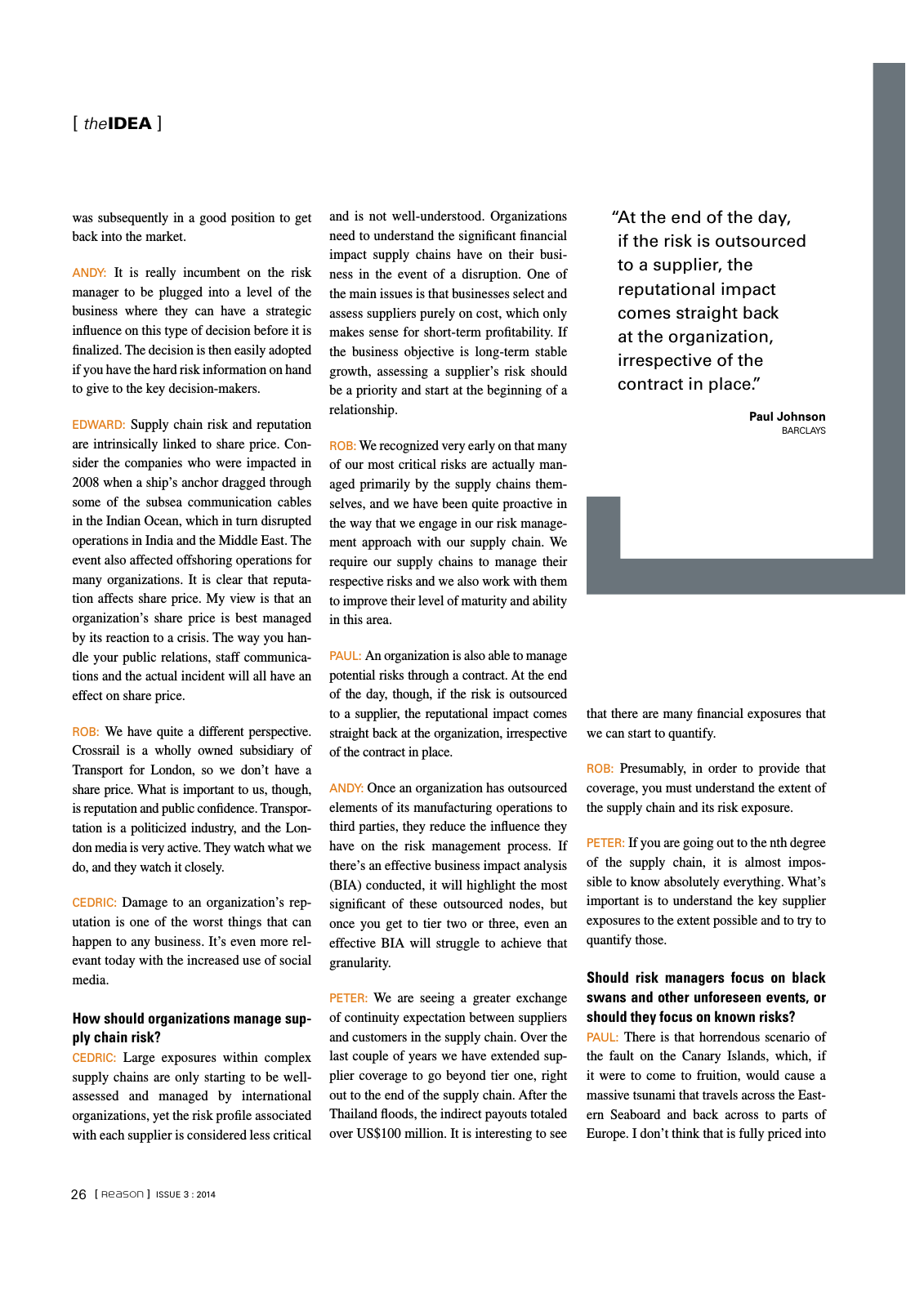Reason Magazin 2014Q3 Seite 26
Hinweis: Dies ist eine maschinenlesbare No-Flash Ansicht.Klicken Sie hier um zur Online-Version zu gelangen.
Inhalt
was subsequently in a good position to get back into the market ANDY It is really incumbent on the risk manager to be plugged into a level of the business where they can have a strategic influence on this type of decision before it is finalized The decision is then easily adopted if you have the hard risk information on hand to give to the key decision makers EDWARD Supply chain risk and reputation are intrinsically linked to share price Con sider the companies who were impacted in 2008 when a ship s anchor dragged through some of the subsea communication cables in the Indian Ocean which in turn disrupted operations in India and the Middle East The event also affected offshoring operations for many organizations It is clear that reputa tion affects share price My view is that an organization s share price is best managed by its reaction to a crisis The way you han dle your public relations staff communica tions and the actual incident will all have an effect on share price ROB We have quite a different perspective Crossrail is a wholly owned subsidiary of Transport for London so we don t have a share price What is important to us though is reputation and public confidence Transpor tation is a politicized industry and the Lon don media is very active They watch what we do and they watch it closely CEDRIC Damage to an organization s rep utation is one of the worst things that can happen to any business It s even more rel evant today with the increased use of social media How should organizations manage sup ply chain risk CEDRIC Large exposures within complex supply chains are only starting to be well assessed and managed by international organizations yet the risk profile associated with each supplier is considered less critical and is not well understood Organizations need to understand the significant financial impact supply chains have on their busi ness in the event of a disruption One of the main issues is that businesses select and assess suppliers purely on cost which only makes sense for short term profitability If the business objective is long term stable growth assessing a supplier s risk should be a priority and start at the beginning of a relationship ROB We recognized very early on that many of our most critical risks are actually man aged primarily by the supply chains them selves and we have been quite proactive in the way that we engage in our risk manage ment approach with our supply chain We require our supply chains to manage their respective risks and we also work with them to improve their level of maturity and ability in this area PAUL An organization is also able to manage potential risks through a contract At the end of the day though if the risk is outsourced to a supplier the reputational impact comes straight back at the organization irrespective of the contract in place ANDY Once an organization has outsourced elements of its manufacturing operations to third parties they reduce the influence they have on the risk management process If there s an effective business impact analysis BIA conducted it will highlight the most significant of these outsourced nodes but once you get to tier two or three even an effective BIA will struggle to achieve that granularity PETER We are seeing a greater exchange of continuity expectation between suppliers and customers in the supply chain Over the last couple of years we have extended sup plier coverage to go beyond tier one right out to the end of the supply chain After the Thailand floods the indirect payouts totaled over US 100 million It is interesting to see that there are many financial exposures that we can start to quantify ROB Presumably in order to provide that coverage you must understand the extent of the supply chain and its risk exposure PETER If you are going out to the nth degree of the supply chain it is almost impos sible to know absolutely everything What s important is to understand the key supplier exposures to the extent possible and to try to quantify those Should risk managers focus on black swans and other unforeseen events or should they focus on known risks PAUL There is that horrendous scenario of the fault on the Canary Islands which if it were to come to fruition would cause a massive tsunami that travels across the East ern Seaboard and back across to parts of Europe I don t think that is fully priced into At the end of the day if the risk is outsourced to a supplier the reputational impact comes straight back at the organization irrespective of the contract in place Paul Johnson BARCLAYS the IDEA 26 Reason ISSUE 3 2014
